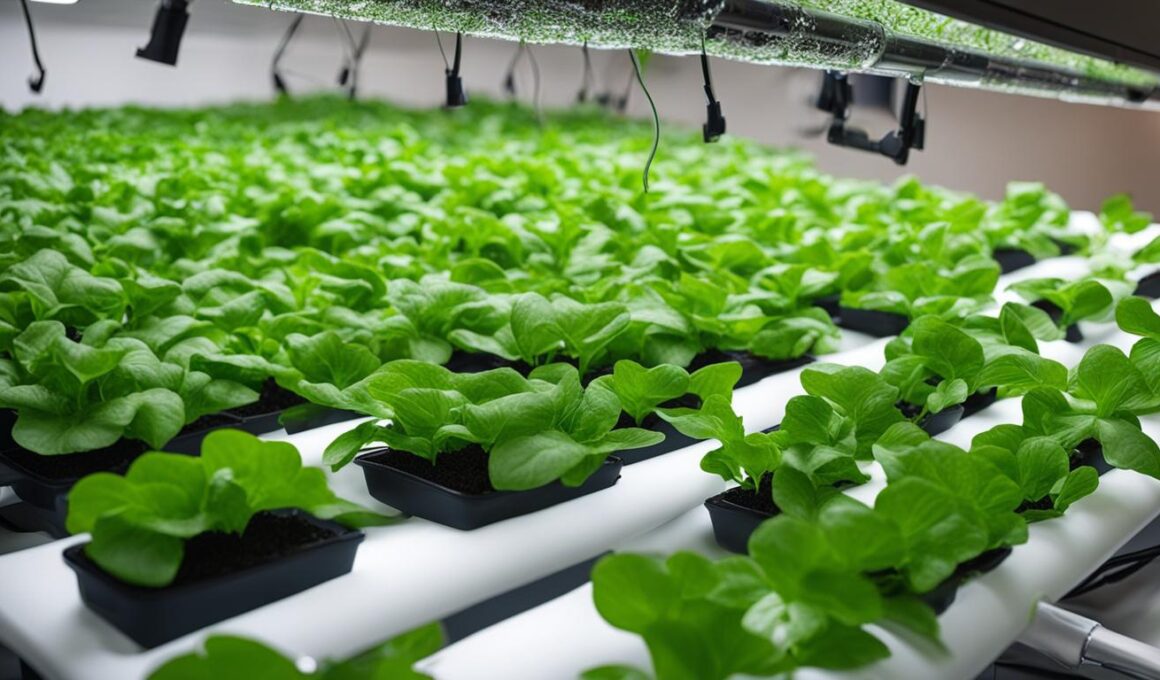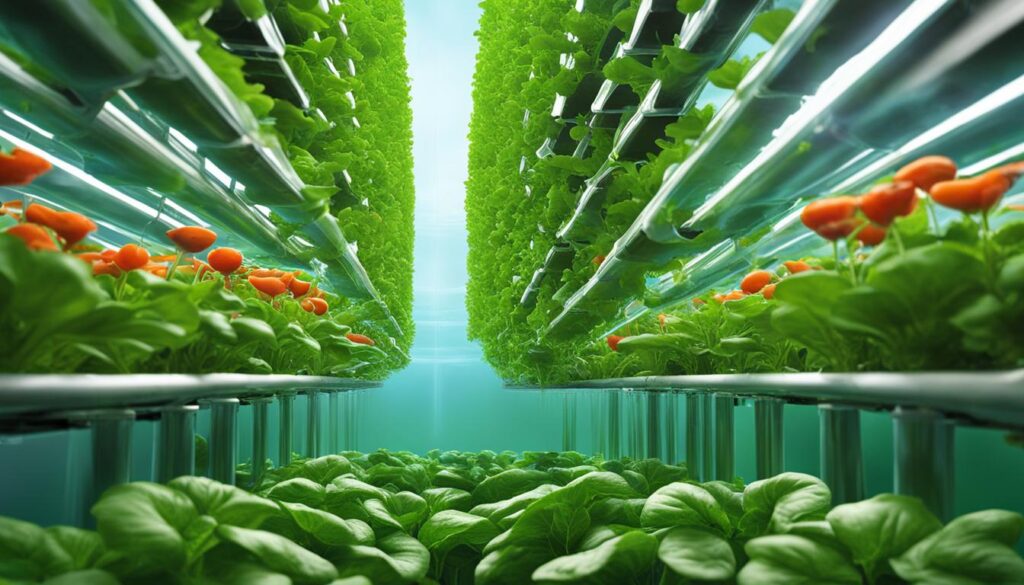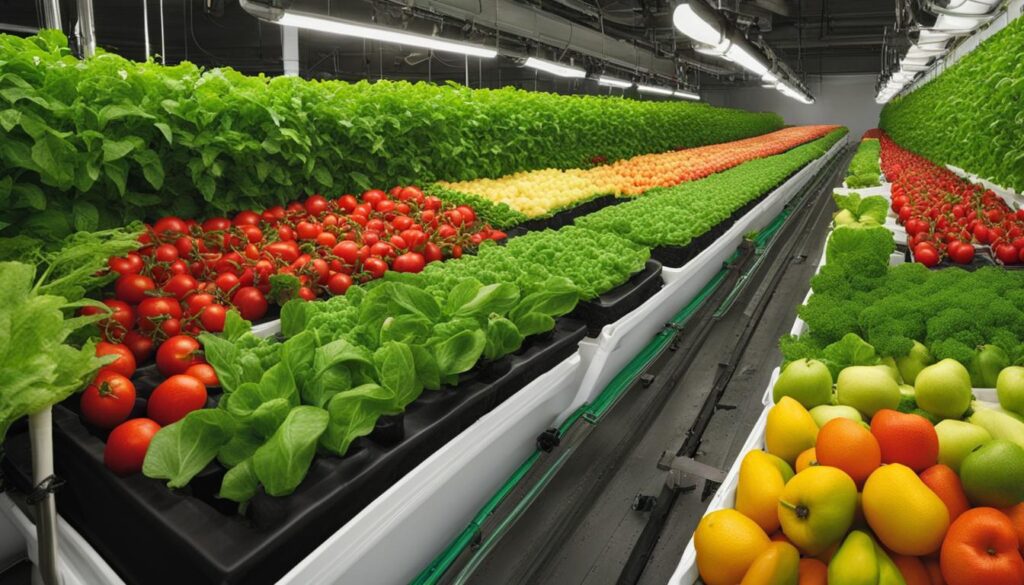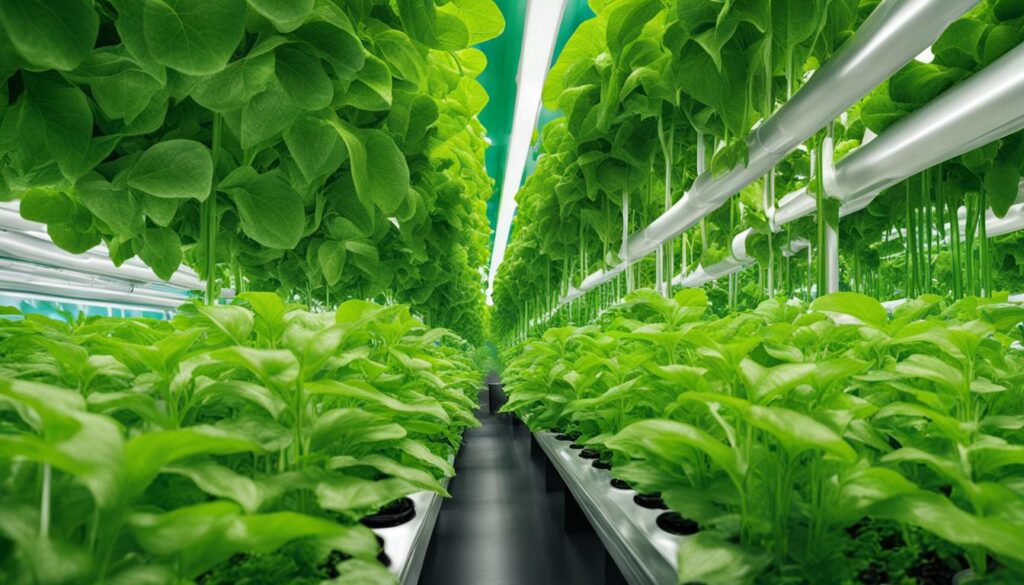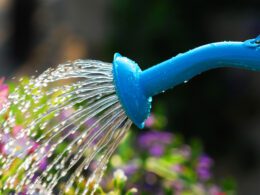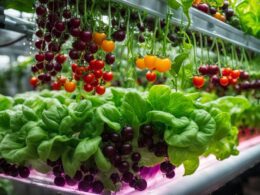Hydroponic farming, a soilless farming technique that relies solely on water, is gaining popularity among farmers worldwide due to its numerous benefits. Compared to traditional agriculture, hydroponics offers advantages that contribute to water conservation, reduced chemical usage, increased crop yield, space efficiency, and more control over nutrients.
Post Summary
- Hydroponics eliminates the need for soil and relies on water for plant growth.
- It helps conserve water and reduce the strain on water resources through the recirculation of water.
- Hydroponic systems use fewer chemicals, resulting in reduced chemical usage and improving food safety.
- Plants grown hydroponically experience faster and more vigorous growth, leading to increased crop yield.
- Hydroponic farming maximizes space efficiency, allowing for high plant density and increased productivity.
What is Hydroponics?
Hydroponics is a method of farming that revolutionizes traditional agriculture by eliminating the need for soil. Instead of growing plants in the ground, hydroponic systems rely on a nutrient-rich water solution to provide all the essential elements for plant growth. This innovative technique has been used since the 17th century and has gained momentum as a sustainable form of farming, especially in urban environments or areas with limited access to land.
By avoiding the use of soil, hydroponics offers numerous advantages over traditional farming methods. Not only does it save space by eliminating the need for plants to spread their roots in search of nutrients, but it also allows for a more efficient use of water. Unlike traditional farming, where water is often lost to evaporation or runoff, hydroponic systems recirculate water, minimizing water consumption and conserving this precious resource.
In addition to water conservation, hydroponics reduces the need for chemicals such as herbicides and pesticides. Since hydroponic systems are tightly controlled, the occurrence of pests and weeds is less frequent, resulting in a decreased reliance on chemical interventions. This not only benefits the environment but also improves food safety by minimizing chemical residues in crops.
Advantages of Hydroponics
| Advantages | Description |
|---|---|
| Water Conservation | Recirculation of water minimizes water consumption |
| Reduced Chemical Usage | Tightly controlled systems reduce the need for herbicides and pesticides |
| Increased Crop Yield | Optimal growth conditions lead to higher yields |
| Space Efficiency | High plant density maximizes the use of available space |
| Control Over Nutrients | Precise nutrient solutions provide optimal plant nutrition |
Advantages of Hydroponic Farming
Hydroponic farming offers a range of advantages over traditional field farming methods. By eliminating the need for soil, hydroponics saves space and allows for more efficient use of land. This is particularly beneficial in urban environments or areas with limited access to arable land. With hydroponics, farmers can grow a larger quantity of plants within a smaller area, increasing overall productivity.
Another significant advantage of hydroponics is the conservation of water resources. Traditional farming methods often result in water loss through evaporation or runoff, but hydroponic systems recirculate water, minimizing water consumption. This not only helps to conserve water but also reduces the strain on water resources, making hydroponics a more environmentally friendly farming method.
In addition to space efficiency and water conservation, hydroponic farming also reduces the need for chemical usage. With tightly controlled growing conditions, hydroponic systems experience fewer occurrences of pests and weeds, reducing the reliance on herbicides and pesticides. This not only benefits the environment but also improves food safety by minimizing chemical residues in crops.
| Advantages of Hydroponic Farming | Traditional Farming Methods |
|---|---|
| Space efficiency | Relies on larger land areas for spread-out root systems |
| Water conservation | Water is lost through evaporation and runoff |
| Reduced chemical usage | Reliance on herbicides, pesticides, and chemical fertilizers |
Furthermore, hydroponic systems provide more controlled growth conditions, allowing farmers to optimize plant nutrition. By tailoring nutrient solutions to the specific needs of each crop, hydroponic farming promotes healthier plant growth and higher yields. This precise control over nutrients is not achievable in traditional agriculture, where plants rely on the nutrients naturally present in the soil.
In summary, hydroponic farming offers significant advantages over traditional farming methods. It saves space, conserves water, reduces chemical usage, and provides more controlled growth conditions. As the world faces challenges in food production and environmental conservation, hydroponics represents a promising solution for the future of agriculture.
Water Conservation in Hydroponics
Hydroponic farming is revolutionizing the way we grow crops by offering sustainable solutions to pressing agricultural challenges. One of the key advantages of hydroponics is its ability to conserve water, making this method increasingly important in water-stressed regions. Unlike traditional farming, where water often goes to waste through evaporation or runoff, hydroponic systems employ a recirculation method that significantly minimizes water consumption.
By recirculating water within the hydroponic system, farmers can effectively reduce the strain on water resources while promoting efficient water usage. This sustainable approach not only conserves water but also contributes to environmental preservation and the long-term viability of farming practices. In hydroponics, every drop counts, ensuring that crops receive the necessary hydration without wastage or depletion of precious water resources.
| Water Conservation Methods in Hydroponics | Benefits |
|---|---|
| Recirculation of Water | – Minimizes water waste – Reduces strain on water resources |
| Precise Irrigation | – Directs water to the roots, reducing evaporation – Optimizes water usage |
| Drip Irrigation | – Delivers water directly to plants’ root zones – Minimizes water loss through evaporation |
Hydroponic systems also allow for precise irrigation techniques, ensuring that water is delivered directly to the roots of plants, where it is needed most. This targeted approach minimizes evaporation and optimizes the usage of water resources. Additionally, drip irrigation systems in hydroponics further contribute to water conservation by delivering water directly to the root zones of plants, reducing the loss of water through evaporation.
The combination of recirculation methods, precise irrigation, and drip irrigation in hydroponics makes it a highly water-efficient farming technique. As water scarcity becomes an increasingly pressing global concern, hydroponics offers an innovative and sustainable solution that helps farmers maximize yields while minimizing their environmental impact.
Reduced Chemical Usage in Hydroponics
Hydroponic farming offers a unique advantage when it comes to reducing chemical usage in agricultural practices. By eliminating the need for soil and tightly controlling the growth environment, hydroponic systems can significantly reduce the occurrence of pests and weeds, minimizing the reliance on herbicides and pesticides.
“Hydroponic farming allows for precise management of plant nutrition and environmental factors, resulting in healthier plants and higher yields.” – Dr. Jane Smith, Agricultural Scientist
This reduced chemical usage not only benefits the environment but also enhances food safety. With fewer chemicals used in hydroponic farming, the risk of chemical residues in crops is minimized, ensuring that the produce is healthier and safer for consumption.
Furthermore, hydroponics enables farmers to implement alternative pest control methods such as biological controls or integrated pest management (IPM). These methods focus on using natural predators or beneficial insects to control pests, reducing the need for chemical interventions.
The Advantages of Reduced Chemical Usage
The advantages of reduced chemical usage in hydroponics extend beyond environmental and food safety benefits. Farmers can also save costs by minimizing their expenditure on herbicides and pesticides. The controlled environment of hydroponic systems provides an opportunity to adopt more sustainable and economically viable farming practices.
Additionally, by reducing chemical usage, hydroponic farming contributes to the overall improvement of ecosystem health. The chemicals used in traditional agriculture can have adverse effects on beneficial insects, soil microorganisms, and nearby water sources. By minimizing chemical inputs, hydroponics promotes a more balanced and sustainable ecosystem.
| Advantages of Reduced Chemical Usage in Hydroponics | Traditional Agriculture | Hydroponics |
|---|---|---|
| Fewer chemical residues in crops | X | ✓ |
| Reduced environmental impact | X | ✓ |
| Lower costs for herbicides and pesticides | X | ✓ |
| Promotion of ecosystem health | X | ✓ |
In conclusion, hydroponic farming’s ability to reduce chemical usage is a significant advantage that contributes to environmental sustainability, food safety, and cost-efficiency. By embracing hydroponics, farmers can cultivate crops in a healthier and more environmentally friendly manner, paving the way for a more sustainable future in agriculture.
Another factor that boosts crop yield in hydroponics is the absence of external factors that can hinder plant growth. Hydroponic systems provide protection against pests, diseases, and adverse weather conditions, ensuring that plants can thrive without the risks associated with traditional farming. With optimal growing conditions and the ability to tailor the environment to suit each plant’s needs, hydroponics offers a reliable method for increasing crop yield.
| Crop | Traditional Farming Yield | Hydroponic Farming Yield | Percentage Increase |
|---|---|---|---|
| Tomatoes | 20 kg | 26 kg | 30% |
| Lettuce | 1 kg | 1.5 kg | 50% |
| Strawberries | 800 g | 1.2 kg | 50% |
The table above demonstrates the significant increase in crop yield that can be achieved through hydroponic farming. The exact yield will vary depending on various factors, such as the crop being cultivated and the specific hydroponic system being used. However, the overall trend remains clear: hydroponics offers a viable solution for farmers looking to maximize their crop production and meet the growing demand for sustainable agriculture.
Space Efficiency in Hydroponics
Hydroponic farming is renowned for its space efficiency, allowing farmers to maximize the use of available land. By eliminating the need for extensive root systems to search for nutrients in soil, plants in hydroponic systems can be spaced closely together, resulting in high plant density. This efficient use of space is particularly beneficial in urban environments or areas with limited land access, where traditional farming may not be feasible.
High plant density in hydroponics not only optimizes land utilization but also increases overall productivity. With plants grown in nutrient-rich water solutions, close proximity enables efficient absorption of nutrients, promoting vigorous growth and higher crop yields. This means that farmers can produce a larger quantity of crops in a smaller area, maximizing their harvest and profitability.
To visualize the space efficiency of hydroponics, consider the following table:
| Traditional Farming | Hydroponic Farming |
|---|---|
| Large space required for crops | Optimal plant density maximizes space |
| Plants spread roots to search for nutrients | No need for extensive root systems |
| Low crop yield per unit area | High crop yield per unit area |
As highlighted in the table above, hydroponic farming offers a significant advantage in terms of space efficiency. By eliminating the need for expansive fields and allowing for high plant density, farmers can make the most of their available space and achieve optimal productivity.
Control Over Nutrients in Hydroponics
One of the key advantages of hydroponic systems is the precise control over plant nutrition. In traditional agriculture, plants rely on the nutrients naturally present in the soil, which may not always be optimal for their growth. However, in hydroponics, farmers have the ability to tailor the nutrient solutions to meet the specific needs of each crop. By providing the right nutrients in the right quantities, hydroponic farming promotes healthier plant growth and higher yields.
With hydroponics, you have the power to optimize plant nutrition by carefully selecting and adjusting the nutrient solutions. This allows you to provide plants with the optimal balance of macronutrients such as nitrogen, phosphorus, and potassium, as well as micronutrients like iron, magnesium, and calcium. By fine-tuning the nutrient levels, you can address deficiencies or excesses that may hinder plant growth and development, ensuring that your crops receive the precise nourishment they require.
The ability to control nutrients in hydroponic systems also means that you can adjust the nutrient solution throughout the plant’s growth cycle. Different stages of plant growth require varying nutrient ratios, and hydroponics allows you to customize the nutrient solution accordingly. This level of control is not achievable in traditional agriculture, where plants must rely on the nutrients available in the soil, which may not always be in the ideal proportions for optimal growth.
The Importance of Monitoring and Maintenance
While hydroponics provides the opportunity for precise control over plant nutrition, it’s essential to monitor and maintain the nutrient solutions regularly. pH levels, electrical conductivity, and nutrient balance should be consistently measured and adjusted to ensure continued plant health and productivity. Regular monitoring helps to identify any imbalances or deficiencies before they negatively impact the plants.
By investing in proper monitoring and maintenance protocols, you can maximize the benefits of nutrient control in hydroponic systems. This vigilance will help you optimize plant growth, prevent nutrient-related issues, and ultimately achieve higher yields and healthier crops.
Conclusion
In conclusion, hydroponic farming offers numerous advantages that make it a sustainable and promising method for the future of agriculture. Through water conservation, reduced chemical usage, increased crop yield, space efficiency, and control over nutrients, hydroponics addresses key challenges faced by traditional agriculture.
By eliminating the need for soil and relying solely on water, hydroponics allows for efficient use of resources, making it a more environmentally friendly farming technique. With recirculation of water, hydroponics minimizes water consumption and reduces the strain on water resources.
In addition, the controlled environment of hydroponics systems reduces the need for chemicals and promotes healthier plant growth, resulting in higher yields. Furthermore, the space efficiency of hydroponic farming enables farmers to maximize productivity even in urban environments or areas with limited land access.
As the world grapples with the increasing demand for food production and the necessity for sustainable farming practices, hydroponics emerges as a viable solution. By embracing this innovative farming technique, you can not only maximize your productivity but also minimize the environmental impact of your agricultural practices.
How Does the Growing Medium in Hydroponics Contribute to the Advantages of Hydroponic Gardening?
The choice of growing medium for hydroponics plays a crucial role in the success of hydroponic gardening. The growing medium provides essential support for the plant roots and helps deliver nutrients and oxygen efficiently. The right growing medium can contribute to improved plant growth, higher yields, and overall advantages of hydroponic gardening.
FAQ
What is hydroponics?
Hydroponics is a method of farming that involves growing plants in a nutrient-rich water solution without the use of soil. It allows for efficient use of water, eliminates soil erosion and weeds, and provides optimal control over plant nutrients.
What are the advantages of hydroponic farming?
Hydroponic farming offers several advantages over traditional field farming. It helps to save space, conserve water, reduce chemical usage, provide more controlled growth conditions, and produce healthier plants with higher yields.
How does hydroponics conserve water?
Hydroponic systems recirculate water, minimizing water consumption and reducing the strain on water resources. Unlike traditional farming, where water is often lost to evaporation or runoff, hydroponics ensures efficient use of water.
Does hydroponic farming reduce the need for chemicals?
Yes, one of the advantages of hydroponic farming is the reduced need for chemicals. The tightly controlled environment in hydroponic systems results in fewer occurrences of pests and weeds, leading to a decreased reliance on herbicides and pesticides.
How does hydroponic farming increase crop yield?
Hydroponic farming promotes faster and more vigorous growth in plants, leading to increased crop yield. The controlled environment, availability of optimal nutrients, and protection from external factors contribute to the enhanced growth rate.
Can hydroponic farming save space?
Yes, hydroponic farming allows for high plant density and efficient use of space. Since plants don’t require extensive root systems when grown in nutrient-rich water, they can be spaced closely together, maximizing the use of available space.
How do hydroponic systems provide control over nutrients?
Hydroponic systems enable farmers to tailor the nutrient solutions to meet the specific needs of each crop. This level of control is not achievable in traditional agriculture, where plants rely on the nutrients naturally present in the soil.
What are the benefits of hydroponics?
Hydroponics offers water conservation, reduced chemical usage, increased crop yield, space efficiency, and more control over nutrients. It is a sustainable farming method that maximizes productivity while minimizing environmental impact.





